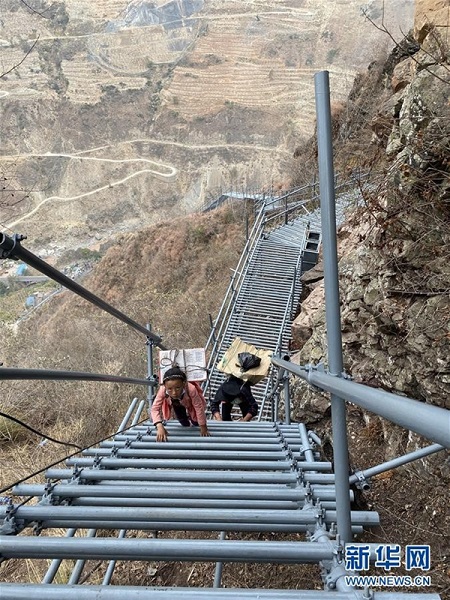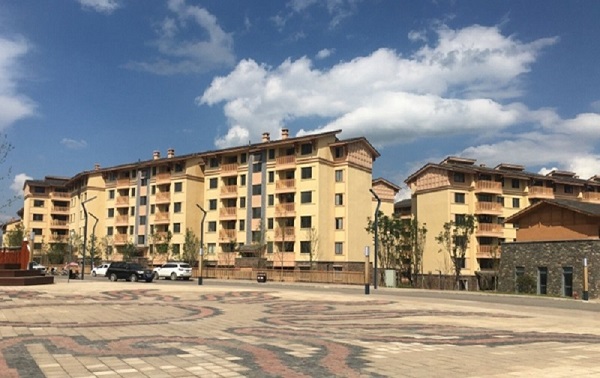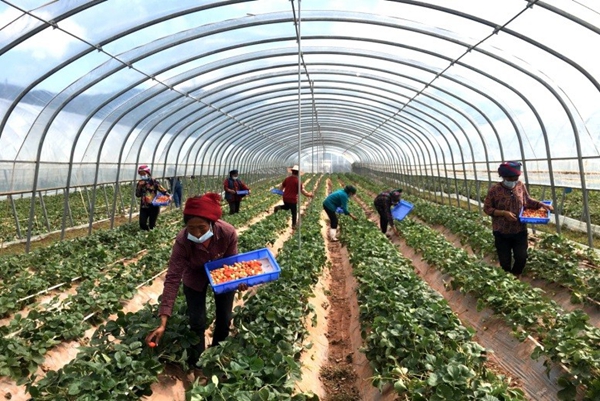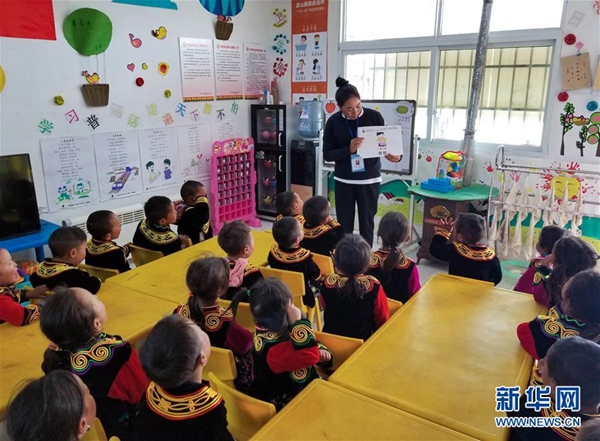By the upper reaches of the Yangtze River in southwest China's Sichuan province lies the vast expanse of the Daliang Mountains. People of the Yi ethnic group have lived here for thousands of years, and the region is still home to the largest Yi communities in the country. However, the mountainous area, known for its stunning views, has also trapped its inhabitants in extreme poverty due to the difficulties of accessing convenient transportation.
By 2017, Liangshan Yi autonomous prefecture, where the Daliang Mountains are located, had 11 impoverished counties out of a total of 17 counties. Within these poor counties were 1,618 poverty-stricken villages and 528,300 poor people. Many of them lived high up on the top of steep mountains, and had to climb long and dangerous rattan ladders to get up and down.
Two villagers climb steel ladders with baskets on their backs in Atulieer village, Zhaojue county, Liangshan Yi autonomous prefecture, China's Sichuan province, on March 24, 2020. [Photo/Xinhua]
Decent houses
Mou'se Labo's video clips on a widely used short video platform in China got more people to know about his hometown Atulieer village, which perched on a cliff-like steep mountain 1,400 meters above sea level. With no roads up or down, the 100-plus households here had to connect to the outside world by rattan ladders. For children studying at the foot of the mountain, it took them more than two hours to get to school. For safety reasons, some did not get education until they were over 10.
Most villagers here grew corn and potatoes for a living. Mou'se Labo used to carry corn and potatoes to the market down the mountain to sell, and often had to drop the prices at the end of the day, or he would have to drag the leftovers back to the mountain top.
The local government allocated 1 million yuan (US$149,800) to replace the rattan ladders with a 2,556-step stainless steel ladder in May 2016, offering the people at the village a safer access to the outside world. However, many still had limited access to modern prosperity due to the inconvenience of transportation.
Local officials admitted that the costs of constructing and maintaining roads could be very high in places with such complex geographical conditions. For some villages, there were few options for building roads, and relocation was the most practical way to lift people out of poverty.
In May 2020, the local government relocated 84 impoverished households in the village to new communities. Mou'se Labo's family, who had lived in a dark mud hut, paid 10,000 yuan to get a big bright house with furniture in his new community.
Residential buildings in the new community are designed with distinctive Yi features, and it is equipped with a common area, a grocery store, an activity room for the elderly, and a study room for the children. A school, a career center, and a maternal and child health center are under construction.
"If I went to buy it on my own, I guess I would never be able to afford such a nice house," Mou'se Labo said. His community Muendi, which means "mansions bathed in kindness," is now home to 6,258 people from 1,428 relocated households. It is the largest relocation community throughout Zhaojue county.
By early September last year, 353,200 people from 74,400 households in Liangshan prefecture had been relocated and begun embracing their new lives in their new homes.
Muendi community in Zhaojue county, Liangshan Yi autonomous prefecture, China's Sichuan province, on Aug. 22, 2020. [Photo/Beijing Review]
New jobs
People did not sit back and relax after moving in. "A good house looks good on the surface, but a sound industry is what really makes lives better," said some in the new community. However, for hundreds of years, people in the villages planted low-value crops for a living, earning a meager income of a few thousand yuan a year.
Local commerce authority in Butuo county, one of the impoverished counties in the Daliang Mountains area, found that the climate here was perfect for growing blueberries. Seeing a short supply in the market, the authority set up a blueberry plantation base in cooperation with a leading agricultural company.
The agricultural company designated technicians to instruct the locals on how to plant and take care of blueberries, and promised a yield of at least 1,000 kilograms per mu (1 mu=0.067 hectare) and a minimum purchasing price of 10 yuan per kilogram after harvest.
The 70-year-old Ciqu Laza works at the base. Despite her advanced age, Ciqu Laza said she is in good health and cherishes the opportunity to work, hoping to earn more to support her family. She now enjoys the subsistence allowance from the government and earns more than 2,000 yuan a month.
Besides farming, the locals can also make money through other means like land transfer. Ciqu Laza's family has transferred more than 18 mu of its land to the base, earning 600 yuan per mu per year. She said the income is a lot higher than merely planting potatoes.
Similarly, Zhaojue county developed its plantation base for strawberries. After a year of development, the base now has 1,800-mu transferred land. In a five-month period between August and December in 2019, more than 20,000 local workers were employed here, each earning 9,000 yuan on average.
Some locals pick up strawberries in the plantation base in Zhaojue county, Liangshan Yi autonomous prefecture, China's Sichuan province, on Aug. 21, 2020. [Photo/Beijing Review]
Promising future
Significant changes are also happening in education. In the past, villagers here believed that it was better to enter the workforce early rather than going to school, but more people now are realizing that only through education can they shake off poverty and change their destiny.
Jilai Zixia, a sophomore at Southwest Medical University, is the first college student from a poor family in Huopu village, Zhaojue county. She said she thinks kids here now are very lucky.
She recalled that in the past, there was no kindergarten in the village, and she did not become a first grader until nine years old. Back then, the roads in the village were not yet hardened, and it was difficult to trudge kilometers of muddy roads to school when it rained. Very few of her peers went to school, as most parents did not realize the importance of education at that time. Now in the village, there are not only flat roads, but also two kindergartens.
Ale Youzi, also from Huopu village, said that instead of comparing whose family has more kids, villagers here now compare whose kids learn better at school.
Now, all the 137 school-age children in the village are enrolled in school. Jilai Zixia has become a role model for the kids in the village, and she plans to return to her hometown after graduation to make it a better place.
The village leaders said that education is a worthwhile investment for the future. They plan to set up a scholarship to encourage more children to pursue higher education after the village becomes better off.
Kids are having a class in a kindergarten in Huopu village, Zhaojue county, Liangshan Yi autonomous prefecture, China's Sichuan province, in March 2019. [Photo/Xinhua]



